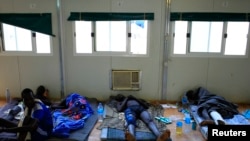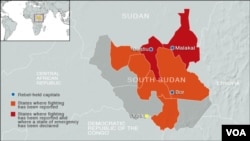JUBA —
The head of the International Committee of the Red Cross (ICRC) wrapped up a three-day visit to South Sudan Wednesday with a call to the warring factions in the world's newest nation to stop targeting civilians and to give aid agencies unfettered access to people in need.
"I am reiterating my urgent call for all parties to the conflict to cease their attacks on civilians and to facilitate safe access for humanitarian agencies," ICRC head Peter Maurer told reporters in Juba.
Maurer said well over 1,000 civilians have been killed in the violence that began in Juba on Dec. 15 in what President Salva Kiir has said was a failed bid to oust him, orchestrated by former Vice President Riek Machar.
Machar has consistently denied the accusations, and observers have said the violence erupted when renegade soldiers attacked an army headquarters building in Juba. The two sides are holding talks in Addis Ababa to try to reach a peace deal.
A precise death toll in the fighting is unknown, but the United Nations Mission in South Sudan (UNMISS) has said at least 1,000 people have been killed and hundreds of thousands have fled their homes since the violence erupted and spread around the country.
“The fact that civilians have to precipitously to flee their homes is obviously a violation of international humanitarian law because their homes have become battlefields of military exchanges," Maurer said.
"We are appealing to all sides to respect the distinction between military and civilian objectives and persons,” he said.
Maurer described the situation in South Sudan as “dire and very difficult” and noted that hospitals are ill-equipped to treat the hundreds -- possibly thousands -- of people suffering from gunshot wounds across the country.
"I was struck to see the lack of capacity of the hospitals, where patients are lying on the floor -- the incoming as well as the operated patients. There are no beds. There are insufficient support staff to treat patients,” Maurer said.
During his visit, the ICRC chief visited a hospital in Bentiu, in Unity state, where ICRC personnel have been treating some of the hundreds of people who have been wounded in fighting between forces loyal to Machar and government troops. Bentiu was captured by Machar loyalists early on in the conflict.
The United Nations said Wednesday there are reports of "large movements of civilians" in the Bentiu area.
Maurer also met with internally displaced people in Awerial, in Lakes state, and said he was "particularly struck by one woman who had to flee her home with no belongings, and now her family needs substantial support across the spectrum, including food, water, shelter and medical care."
French medical charity Medecins sans Frontieres (MSF) said Wednesday some 75,000 people have sought refuge in Awerial, a town which is usually home to around 10,000. Most of the diplaced are women and children, MSF said.
With the ICRC having already spent a third of the 65 million Swiss Francs it had budgeted for South Sudan this year, Maurer called on "the international community to boost its financial support" to the organization to allow it to continue its humanitarian activities in the strife-torn nation.
"I am reiterating my urgent call for all parties to the conflict to cease their attacks on civilians and to facilitate safe access for humanitarian agencies," ICRC head Peter Maurer told reporters in Juba.
Maurer said well over 1,000 civilians have been killed in the violence that began in Juba on Dec. 15 in what President Salva Kiir has said was a failed bid to oust him, orchestrated by former Vice President Riek Machar.
Machar has consistently denied the accusations, and observers have said the violence erupted when renegade soldiers attacked an army headquarters building in Juba. The two sides are holding talks in Addis Ababa to try to reach a peace deal.
A precise death toll in the fighting is unknown, but the United Nations Mission in South Sudan (UNMISS) has said at least 1,000 people have been killed and hundreds of thousands have fled their homes since the violence erupted and spread around the country.
“The fact that civilians have to precipitously to flee their homes is obviously a violation of international humanitarian law because their homes have become battlefields of military exchanges," Maurer said.
"We are appealing to all sides to respect the distinction between military and civilian objectives and persons,” he said.
'Dire and difficult' situation in South Sudan
Maurer described the situation in South Sudan as “dire and very difficult” and noted that hospitals are ill-equipped to treat the hundreds -- possibly thousands -- of people suffering from gunshot wounds across the country."I was struck to see the lack of capacity of the hospitals, where patients are lying on the floor -- the incoming as well as the operated patients. There are no beds. There are insufficient support staff to treat patients,” Maurer said.
During his visit, the ICRC chief visited a hospital in Bentiu, in Unity state, where ICRC personnel have been treating some of the hundreds of people who have been wounded in fighting between forces loyal to Machar and government troops. Bentiu was captured by Machar loyalists early on in the conflict.
The United Nations said Wednesday there are reports of "large movements of civilians" in the Bentiu area.
Maurer also met with internally displaced people in Awerial, in Lakes state, and said he was "particularly struck by one woman who had to flee her home with no belongings, and now her family needs substantial support across the spectrum, including food, water, shelter and medical care."
French medical charity Medecins sans Frontieres (MSF) said Wednesday some 75,000 people have sought refuge in Awerial, a town which is usually home to around 10,000. Most of the diplaced are women and children, MSF said.
With the ICRC having already spent a third of the 65 million Swiss Francs it had budgeted for South Sudan this year, Maurer called on "the international community to boost its financial support" to the organization to allow it to continue its humanitarian activities in the strife-torn nation.





